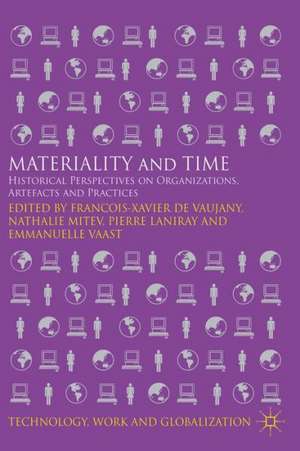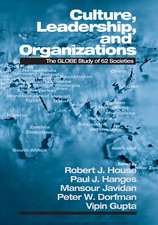Materiality and Time: Historical Perspectives on Organizations, Artefacts and Practices: Technology, Work and Globalization
Editat de Kenneth A. Loparo, N. Mitev, P. Laniray, E. Vaasten Limba Engleză Hardback – 30 sep 2014
| Toate formatele și edițiile | Preț | Express |
|---|---|---|
| Paperback (1) | 638.57 lei 6-8 săpt. | |
| Palgrave Macmillan UK – 30 sep 2014 | 638.57 lei 6-8 săpt. | |
| Hardback (1) | 646.94 lei 6-8 săpt. | |
| Palgrave Macmillan UK – 30 sep 2014 | 646.94 lei 6-8 săpt. |
Din seria Technology, Work and Globalization
- 15%
 Preț: 644.18 lei
Preț: 644.18 lei - 15%
 Preț: 640.37 lei
Preț: 640.37 lei - 18%
 Preț: 1117.19 lei
Preț: 1117.19 lei - 15%
 Preț: 643.65 lei
Preț: 643.65 lei - 18%
 Preț: 1002.31 lei
Preț: 1002.31 lei -
 Preț: 319.59 lei
Preț: 319.59 lei - 18%
 Preț: 729.53 lei
Preț: 729.53 lei -
 Preț: 387.75 lei
Preț: 387.75 lei -
 Preț: 400.26 lei
Preț: 400.26 lei -
 Preț: 382.18 lei
Preț: 382.18 lei - 18%
 Preț: 1222.31 lei
Preț: 1222.31 lei - 18%
 Preț: 1005.92 lei
Preț: 1005.92 lei - 15%
 Preț: 648.24 lei
Preț: 648.24 lei - 18%
 Preț: 893.53 lei
Preț: 893.53 lei - 15%
 Preț: 640.06 lei
Preț: 640.06 lei -
 Preț: 396.40 lei
Preț: 396.40 lei - 15%
 Preț: 479.06 lei
Preț: 479.06 lei - 15%
 Preț: 641.20 lei
Preț: 641.20 lei -
 Preț: 395.47 lei
Preț: 395.47 lei - 18%
 Preț: 730.16 lei
Preț: 730.16 lei - 15%
 Preț: 647.59 lei
Preț: 647.59 lei - 18%
 Preț: 952.89 lei
Preț: 952.89 lei - 15%
 Preț: 654.77 lei
Preț: 654.77 lei -
 Preț: 395.47 lei
Preț: 395.47 lei -
 Preț: 500.91 lei
Preț: 500.91 lei - 18%
 Preț: 1009.08 lei
Preț: 1009.08 lei -
 Preț: 424.99 lei
Preț: 424.99 lei - 15%
 Preț: 476.51 lei
Preț: 476.51 lei - 15%
 Preț: 654.77 lei
Preț: 654.77 lei - 15%
 Preț: 645.79 lei
Preț: 645.79 lei -
 Preț: 397.16 lei
Preț: 397.16 lei - 15%
 Preț: 647.40 lei
Preț: 647.40 lei - 15%
 Preț: 653.14 lei
Preț: 653.14 lei
Preț: 646.94 lei
Preț vechi: 761.10 lei
-15% Nou
Puncte Express: 970
Preț estimativ în valută:
123.79€ • 129.26$ • 102.22£
123.79€ • 129.26$ • 102.22£
Carte tipărită la comandă
Livrare economică 15-29 aprilie
Preluare comenzi: 021 569.72.76
Specificații
ISBN-13: 9781137432100
ISBN-10: 1137432101
Pagini: 247
Ilustrații: X, 247 p.
Dimensiuni: 155 x 235 x 22 mm
Greutate: 0.6 kg
Ediția:2014
Editura: Palgrave Macmillan UK
Colecția Palgrave Macmillan
Seria Technology, Work and Globalization
Locul publicării:London, United Kingdom
ISBN-10: 1137432101
Pagini: 247
Ilustrații: X, 247 p.
Dimensiuni: 155 x 235 x 22 mm
Greutate: 0.6 kg
Ediția:2014
Editura: Palgrave Macmillan UK
Colecția Palgrave Macmillan
Seria Technology, Work and Globalization
Locul publicării:London, United Kingdom
Cuprins
Introduction: Time And Materiality: What Is At Stake In The Materialization Of Time And Time As A Materialization?; Francois-Xavier De Vaujany, Nathalie Mitev, Emmanuelle Vaast And Pierre Laniray PART I: MATERIALIZING TIME AND HISTORY IN ORGANIZATIONS: WHAT IS AT STAKE? 1. Time, History And Materiality; Joanne Yates 2. Dual Iconographies And Legitimation Practices In Contemporary Organizations: A Tale Of The Former Nato Command Room; François-Xavier De Vaujany And Emmanuelle Vaast 3. Evolution Of Non-Technical Standards: The Case Of Fair Trade; Nadine Arnold PART II: TEMPORAL DYNAMICS OF ARTIFACTS AND MATERIALITY IN ORGANIZATIONS: THE IMPORTANCE OF MATERIAL TRACES 4. Making Organizational Facts, Standards And Routines: Tracing Materialities And Materialising Traces; Christine Mclean and Jeremy Aroles 5. Management Control Artefacts: An Enabling Or Constraining Tool For Action? Questioning The Definition And Uses Of The Concept Of Affordances From A Management Control Perspective; Emilie Berard 6. Clocks, Clerks, Customers: Queue Management Systems, Post-Socialist Sensibilities And Performance Measurement At A Retail Bank; Zsuzsanna Vargha 7. When The Omerta Is Broken: Sociomateriality And The History Of Hazing In French Universities; Hélène Lambrix PART III: STRETCHING OUT TIME AND MATERIALITY IN ORGANIZATIONS: FROM PRESENTISM TO LONGUE DURÉE 8. The Historian's Present; François Hartog 9. The Role Of History In Information Systems Research: Beyond Presentism; Nathalie Mitev 10. The Principles Of [Campus]Es Conception: A Spatial And Organisational Genealogy. What Knowledge Can We Use From A Historical Study In Order To Analyse The Design Processes Of A New Campus?; Caroline Scotto Conclusion: Understanding Materiality And The Material Underpinnings Of Organizations Through A Longue Duree Approach; Nathalie Mitev, François-Xavier De Vaujany, Emmanuelle Vaast And Pierre Laniray Epilogue: Strategic Coordination Information Technologies AndEurope-Usa's Organizations. Time-And-History Regimes And Information Technologies In Refolding Long-Term Elective Affinities; Peter Clark
Notă biografică
Pierre Laniray is a PhD candidate at Université Paris-Dauphine having obtained a Masters in Political Science and a Masters in Business Consulting and Information Technologies. Grounded in organization theory and information systems, his current research looks at the sociomaterial aspects of professional identity (or workplace identity). His teachings relate to management of information systems and strategizing with ICT.
Nathalie Mitev is an Associate Professor at the London School of Economics, Information Systems and Innovation Group, Department of Management and has held prior positions at Salford University in Manchester and City University Business School in London. Her research focuses on the organizational aspects of information systems and technology, particularly from a sociological and political perspective. She has published critical work in management studies, including the Journal of Management Studies, Management Learning, and Personnel Review, and information systems, such as the European Journal of Information Systems, the Journal of Information Technology, Information Technology and People, The Information Society, and Information Technology for Development. She is a visiting professor at the Ecole de Management de Strasbourg and the Institut d'Administration des Entreprises at Grenoble University.
Emmanuelle Vaast is an associate professor of information systems atthe Desautels Faculty of Management of McGill University. She received her Ph.D. from Ecole Polytechnique, France. Her research questions practices and their transformations at the individual, community, network, organizational, and field levels, especially as they relate to innovations and the introduction of new technologies.
François-Xavier de Vaujany is professor of management and organization studies at Université Paris-Dauphine, France. His research focuses on the relationship between space, artefacts and practices in organizations, in particular (but not exclusively) in the context of ICT-related practices. His main ongoing research explores the relationship between spatial practices and legitimacy (in particular for global universities or business schools), information and sociomaterial practices, or fashion cycles in the adoption of IT by organizations (through the ethnographic analysis of tradeshows in France and Spain).
Nathalie Mitev is an Associate Professor at the London School of Economics, Information Systems and Innovation Group, Department of Management and has held prior positions at Salford University in Manchester and City University Business School in London. Her research focuses on the organizational aspects of information systems and technology, particularly from a sociological and political perspective. She has published critical work in management studies, including the Journal of Management Studies, Management Learning, and Personnel Review, and information systems, such as the European Journal of Information Systems, the Journal of Information Technology, Information Technology and People, The Information Society, and Information Technology for Development. She is a visiting professor at the Ecole de Management de Strasbourg and the Institut d'Administration des Entreprises at Grenoble University.
Emmanuelle Vaast is an associate professor of information systems atthe Desautels Faculty of Management of McGill University. She received her Ph.D. from Ecole Polytechnique, France. Her research questions practices and their transformations at the individual, community, network, organizational, and field levels, especially as they relate to innovations and the introduction of new technologies.
François-Xavier de Vaujany is professor of management and organization studies at Université Paris-Dauphine, France. His research focuses on the relationship between space, artefacts and practices in organizations, in particular (but not exclusively) in the context of ICT-related practices. His main ongoing research explores the relationship between spatial practices and legitimacy (in particular for global universities or business schools), information and sociomaterial practices, or fashion cycles in the adoption of IT by organizations (through the ethnographic analysis of tradeshows in France and Spain).

















